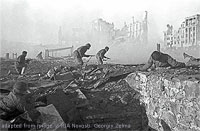Presidential Library opens access to declassified materials on World War II

ST. PETERSBURG. June 13 (Interfax) – The Presidential Library named after Yeltsin has opened access to declassified and little known documents coming to its fund.
“We began digitizing declassified materials almost three years ago. We work with the archive of the defense ministry and other official archives. Documents are declassified, we digitize them, put them in our funds and wide access to them is given at the portal,” the library’s press office quoted its General Director Alexander Vershinin as saying.
The Presidential Library released electronic and paper version of “1941” book two years ago. The book comprised materials on the course of events and the atmosphere prior to and at the beginning of the war. Many published documents, including those from the funds of the Defense Ministry’s Central Archive, have recently been unavailable even to experts. Now they are posted on the library’s website.
The library is working on presenting rare documents on the history of the Russian navy since its establishment. Its readers currently have access to the many volumes of “The Soviet Navy in the World War II of 1940-1945” published confidentially in 1959-1962 and initially meant for army and navy officers and admirals.
It is planned to digitize 33 volumes of the timeline of main navy and fleet battles, around 100 battle maps and about 2,000 pictures of the World War II period for the 70th Victory Day celebration. An electronic collection “The Encyclopedia of Declassified Materials – the Participation of the Soviet Navy in the World War II” could be formed upon the digitized declassified materials.
It is planned that materials from the Naval Academy named after Soviet Admiral N. Kuznetsov will soon be given to the library. The library and the academy signed an agreement in April 2013. Digitizing printed, hand-written editions, photo documents and audiovisual materials provided by the academy will be an important part of the cooperation.
